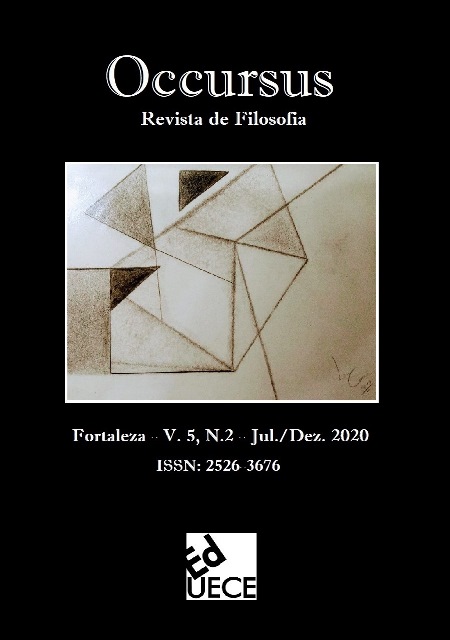A ética-mística de Plotino: breve exame sobre a presença do intelectualismo socrático
Palavras-chave:
Sócrates. Akrasia. Plotino. Intelectualismo. Ética.Resumo
No Protágoras (352a - 353e) a concepção segundo a qual alguém age pelo mal ou pelo erro de maneira consciente (isto é, gnosiológica) é questionada, o que enseja a reflexão a respeito da akrasia, isto é, da incontinência ou da privação de autocontrole perante os impulsos dos desejos, prazeres e de inclinações externas em geral. A hipótese socrática da ignorância (amathía) como explicação, em vez de uma instruída deliberação pelo mal, faz aparecer uma concepção que se atribui a Sócrates, a saber, a de seu “intelectualismo”. Pretende-se discutir os limites dessa concepção intelectualista quando aplicada a discussão da akrasia. Assim como se propõe um breve exame sobre se Plotino teria assumido uma postura semelhante ao intelectualismo socrático em sua filosofia. Para tanto, faz-se necessária a leitura dos excertos pertinentes das Enéadas.
Referências
ARISTÓTELES. Ética a Nicômaco. Trad. Mário da Gama Kury. Brasília: Editora Universidade de Brasília, 1985.
BERG, Robert. Plotinus’s Socratic Intellectualism. Proceedings of the Boston Area Colloquium in Ancient Philosophy, Vol. XXVIII eds. Gary M. Gurtler, SJ, and William Wians, Brill: Leiden/Boston 2013, pp.217-231.
BRANDÃO, Bernardo. Contra os dois mundos em Plotino: uma interpretação a partir do Platão de Marcelo Marques. CLASSICA (SAO PAULO), v. 31, p. 229-235, 2018.
BRANDÃO, Bernardo. A Experiência Mística Intelectual na Filosofia de Plotino. Hypnos (PUCSP), v. 21, p. 245-260, 2008.
BRISSON, Luc. Pode-se falar de união mística em Plotino? Trad. Loraine de Oliveira. Kriterion (Belo Horizonte), vol.48, n.116, 2007, pp. 453-466.
CATAPANO, Giovanni. Na origem da imperscrutabilidade do princípio: Plotino e Agostinho. Trad. Fabrício Klain. Trilhas Filosóficas, Caicó, ano 13, n. 1, 2020, pp. 237- 241.
FEITOSA, Zoraida. A questão da acrasia na filosofia de Platão. Prometeus, Ano 10, N° 23, maio-agosto/2017, pp.215-229.
GERSON, Lloyd. Plotinus on Weakness of Will: The Neoplatonic Synthesis. In: Weakness of Will From Plato to the Present. Ed. Tobias Hoffman. Washington: Catholic University of America Press, 2008.pp 42-57.
LIGHTBODY, Brian. Socratic Appetites as Plotinian Reflectors: A New Interpretation of Plotinus’s Socratic Intellectualism. Journal of Ancient Philosophy, vol. 14 issue 1, 2020. pp.91-115.
NEHAMAS, Alexander. Virtues of Authenticity: Essays on Plato and Socrates. New Jersey: Princeton University Press, 1999.
OLIVEIRA, Loraine. Notas sobre lógica e dialética em Plotino. (Enéada I, 3 [20] 4-5). Trans/Form/Ação, v. 30, p. 167-178, 2007.
PLATÃO. Protágoras. Trad.Carlos Alberto Nunes. Universidade Federal do Pará, 1980.
PLATÃO. Teeteto. Trad. Adriana Manuela e Marcelo Boeri. Fundação Calouste Gulbenkian. 3 ed. Lisboa, 2010.
PLATÃO. Timeu-Crítias. Tradução do grego, introdução e notas de Rodolfo Lopes. São Paulo: Annablume Clássica; Coimbra: IUC, CECH, 2012.
PLATÃO. Êutifron, Apologia de Sócrates, Críton. Tradução, Introdução e Notas de José Trindade Santos. Lisboa: Imprensa Nacional - Casa Moeda, 1983.
PLOTINO. Enéadas I, II e III; Porfírio, Vida de Plotino. Tradução e notas de Junior Baracat. (Doutorado em Letras). Universidade Estadual de Campinas, Campinas, 2006.
PLOTINO. Tratados das Enéadas. Trad. Américo Sommerman. São Paulo: Polar, 2007.
PLOTINO. Enéadas. Introducciones, Traducciones y Notas de J. Igal. Madrid: Gredos, 1992.
PLOTINO. Sobre as Hipóstases que têm a Faculdade de Conhecer e sobre o Transcendente. Trad. Silvania Gollnick. In: Ontologia e conhecimento no V.3(49) de Plotino. Dissertação (Mestrado em Filosofia) - Universidade Federal de Santa Catarina, Florianópolis, 2005. pp.115-127.
REMES, Pauliina. Plotinus's Ethics of Desinterested Interest. Journal of the History of Philosophy, Volume 44, Number 1, January 2006, pp. 1-23.
SCHÄFER, Christian. Matter in Plotinus's Normative Ontology. Phronesis, Vol. 49, No. 3 (2004), pp. 266-294.
SEGVIC, Heda. No one errs willingly: the meaning of Socratic intellectualism’, OSAP. 19 (2000), 1–45.
VIEIRA, Ivan. Filosofia, religião e misticismo na Antiguidade Tardia: Plotino, Porfírio e Jâmblico e as diferentes nuances do neoplatonismo. Revista Archai: Revista de Estudos sobre as Origens do Pensamento Ocidental, v. 5, p. 129-136, 2010.
WATTS, Niki. The Oxford New Greek Dictionary. New York: Berkley Books, 2008.
Downloads
Publicado
Como Citar
Edição
Seção
Licença
Copyright (c) 2024 Robert Brenner Barreto da Silva

Este trabalho está licenciado sob uma licença Creative Commons Attribution 4.0 International License.




